Women’s Super Combined
I got a lot of fatuous, politically correct flak for declaring that it’s more exciting to watch men compete in Slopestyle than it is to watch women. Flak, incidentally, that made about as much sense as getting flak for declaring that it’s more exciting to watch men race down a regular slope than it is to watch women race down a bunny slope.
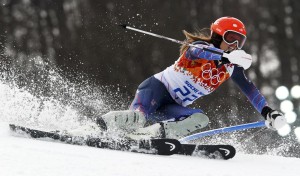 Well, perhaps my critics will appreciate my declaring, as I did four years ago, that it’s even more exciting to watch women compete in Olympic Alpine skiing as it is to watch men. For there’s no discernible difference between the sexes in the technical skill and daring speed they display when racing in Slalom and Downhill events. And to see so many beautiful women performing such feats of athleticism is, well, very thrilling indeed.
Well, perhaps my critics will appreciate my declaring, as I did four years ago, that it’s even more exciting to watch women compete in Olympic Alpine skiing as it is to watch men. For there’s no discernible difference between the sexes in the technical skill and daring speed they display when racing in Slalom and Downhill events. And to see so many beautiful women performing such feats of athleticism is, well, very thrilling indeed.
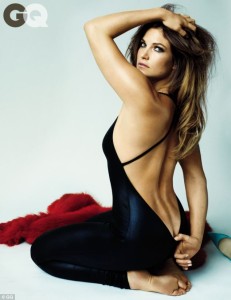 That said, I was especially thrilled to see my favorite Olympian, Julia Mancuso, competing in this, her first event of these Games, which combines both Alpine disciplines.
That said, I was especially thrilled to see my favorite Olympian, Julia Mancuso, competing in this, her first event of these Games, which combines both Alpine disciplines.
Given all of the media focus on Vonn these days, you’d never know that Julia Mancuso is America’s most decorated female Olympic skier: gold in Giant Slalom at the 2006 Torino Olympics; silver (behind Vonn) in Downhill and silver in Super Combined at the 2010 Vancouver Olympics.
What’s more, she was likely to win more medals than any other American skier in Sochi even before Vonn re-injured her knee.
(“The Lolo Jonesing of Lindsey Vonn,” The iPINIONS Journal, December 4, 2013)
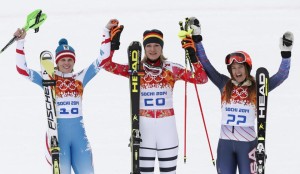 Well, having won silver in Super Combined in Vancouver, Mancuso surely hoped to do better in Sochi. Except that defending Olympic champion, Maria Hoefl-Riesch of Germany, proved even more invincible this time. She defended her title, despite finding herself out of medal contention after the Downhill.
Well, having won silver in Super Combined in Vancouver, Mancuso surely hoped to do better in Sochi. Except that defending Olympic champion, Maria Hoefl-Riesch of Germany, proved even more invincible this time. She defended her title, despite finding herself out of medal contention after the Downhill.
‘It’s unbelievable. Of course, I was the big favorite for today,’ said Hoefl-Riesch, who retained her Olympic title in an event designed to test the best all-around skier. ‘But I had some problems on the downhill course.’
(The Associated Press, February 10, 2014)
Nicole Hosp of Austria won Silver. But Mancuso still padded her tally as America’s most decorated female Olympic skier by winning bronze. And she’s poised to pad it even more in the Women’s Downhill on Wednesday.
Men’s Speedskating 500 (long track)
It’s a shame Davis is not more of a household name in America. He’s clearly a very disciplined and polite, even if somewhat guarded, athlete. Of course, with Football, Baseball, Basketball, and many other sports competing for popularity, it’s understandable that Speedskating is virtually unknown here. But to the extent it is, I wonder why Davis does not get even one-tenth of the media coverage, to say nothing of the commercial endorsements, Apolo Ohno gets.
(“2010 Winter Olympics…,” The iPINIONS Journal, February 22, 2010)
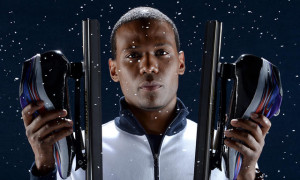 I suppose there’s some consolation in United Airlines now featuring Shani Davis among other U.S. Olympians in a commercial, in which they’re all pretending to board flights to Sochi fully dressed for competition. But this is hardly as prestigious or lucrative as featuring him alone: the way Chobani is featuring snowboarder Lindsey Jacobellis, who is more famous for losing than winning Olympic gold medals; or even the way Kellogg’s, NyQuil, and Walgreens are all featuring Alpine skier Ted Ligety, who at least won gold in Men’s Combined at the 2006 Torino Olympics.
I suppose there’s some consolation in United Airlines now featuring Shani Davis among other U.S. Olympians in a commercial, in which they’re all pretending to board flights to Sochi fully dressed for competition. But this is hardly as prestigious or lucrative as featuring him alone: the way Chobani is featuring snowboarder Lindsey Jacobellis, who is more famous for losing than winning Olympic gold medals; or even the way Kellogg’s, NyQuil, and Walgreens are all featuring Alpine skier Ted Ligety, who at least won gold in Men’s Combined at the 2006 Torino Olympics.
Meanwhile, as improbable as it may seem, this Black American rivals the “flying Dutchman,” Sven Kramer, as the face of Olympic Speedskating. Kramer, a one-time defending champion coming into these Games, has already defended his Vancouver title in his signature event, the Men’s 5000. Davis, a two-time defending champion, will be defending his Vancouver and Torino titles in his signature event, the Men’s 1000, on Wednesday.
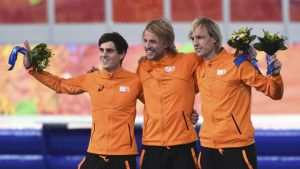 Both men are so good, however, that they were deemed bona-fide contenders in other events: Kramer in the 10,000, where he’s actually favored; Davis in the 500, where he failed to medal today, placing 24th. (He said afterwards, perhaps a little too glibly, that he only participated in this event as part of his preparation for the 1000.)
Both men are so good, however, that they were deemed bona-fide contenders in other events: Kramer in the 10,000, where he’s actually favored; Davis in the 500, where he failed to medal today, placing 24th. (He said afterwards, perhaps a little too glibly, that he only participated in this event as part of his preparation for the 1000.)
For the record, though, the Netherlands continued their dominance in this sport by emulating their sweep in the 5000 with a sweep in this event too, complete with twin brothers Michel and Ronald Mulder winning gold and bronze, respectively. Their teammate Jan Smeekens completed the trifecta with silver.
Men’s Speedskating 1500 (short track)
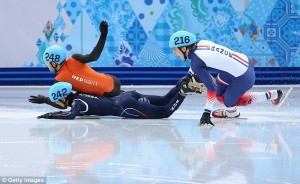 I confess that I knew little about this event until the media began covering Apolo Ohno at the 2002 Winter Olympics in Salt Lake City the way they began covering Usain Bolt at the 2008 Summer Olympics in Beijing. Ohno won gold in this event in Salt Lake.
I confess that I knew little about this event until the media began covering Apolo Ohno at the 2002 Winter Olympics in Salt Lake City the way they began covering Usain Bolt at the 2008 Summer Olympics in Beijing. Ohno won gold in this event in Salt Lake.
For the uninitiated, short track speedskating is to long track speedskating what Arena Football is to the NFL or what Bumper Pool is to Billiards: it’s quicker paced and, as much as some might resent it, more like Roller Derby on ice.
J.R. Celski hails from the same town (Federal Way, Washington) as Ohno and is America’s top hope at these Games. He became Ohno’s heir apparent after he won bronze in this event four years ago in Vancouver. Alas, he failed to even medal this time, placing a disappointing fourth.
Charles Hamelin of Canada won gold; Tianyu Han of China, silver; and Viktor Ahn of Russia, bronze.
Men’s Moguls
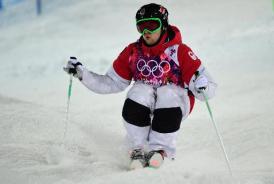 Ironically, Alexandre Bilodeau of Canada is known more for his endearing and celebrated relationship with his older brother, who was born with cerebral palsy, than for his gold medal in this event at the Vancouver Games.
Ironically, Alexandre Bilodeau of Canada is known more for his endearing and celebrated relationship with his older brother, who was born with cerebral palsy, than for his gold medal in this event at the Vancouver Games.
And, sure enough, commentators seemed to be talking more about that relationship than about Bilodeau’s skiing during today’s competition.
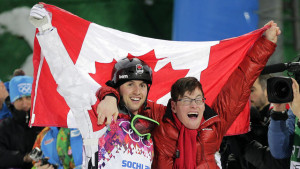 All the same, he led another one-two punch for Canada in moguls, emulating the Dufour-Lapointe sisters by winning gold with teammate Mikael Kingsbury winning silver. Alexandr Smyshlyaev of Russia won bronze.
All the same, he led another one-two punch for Canada in moguls, emulating the Dufour-Lapointe sisters by winning gold with teammate Mikael Kingsbury winning silver. Alexandr Smyshlyaev of Russia won bronze.
After completing his podium duties, Bilodeau then went over to hug his older brother, Frederic, who suffers from cerebral palsy, and helped him over a barrier to celebrate his medal.
‘It was amazing. My brother is my everyday inspiration,’ said Bilodeau.
‘Like I say all the time, if he had the life that I have lived, he would be a three-time Olympic champion.’
(Agence France-Presse, February 10, 2014)
How’s that for the spirit of an Olympic champion!
MEDAL COUNT
Canada: 7; Netherlands: 7; Norway: 7
Related commentaries:
Jonesing Vonn…
2010 Olympic…